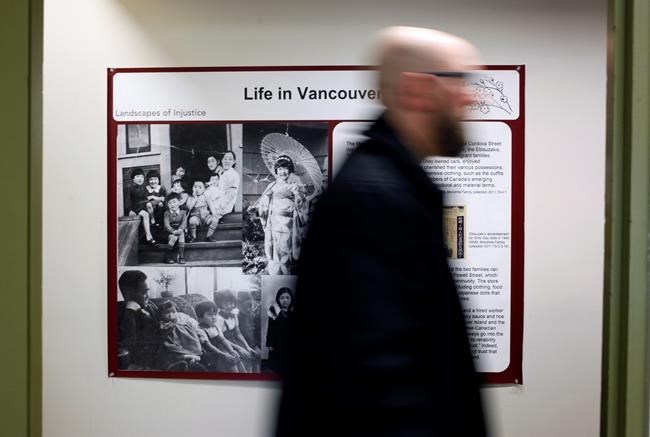
UVic historian Jordan Stanger-Ross is leading Landscapes of Injustice, a research project in the field of humanities in Canada about the letters of outrage reflecting injustices towards Japanese Canadians as he walks by Landscape of Injustice sign in the Sedgwick Building at the University of Victoria in Victoria, B.C., on Tuesday, November 7, 2017. THE CANADIAN PRESS/Chad Hipolito
Republished November 09, 2017 - 3:05 PM
Original Publication Date November 07, 2017 - 12:01 PM
VICTORIA - Judy Hanazawa says the federal government sold her family's fishing boats and homes while her parents were in internment camps during the Second World War, but what hits hardest is seeing a 70-year-old letter from her father disputing a government cheque for $14.68.
Hanazawa had never seen the letter until recently, but the Vancouver resident said reading it conveys the sense of betrayal her father must have felt losing family possessions and having to start over with almost nothing after he was held in a camp in British Columbia's Interior.
"My dad, in writing this letter, was really intent on being dignified in how he approached the government," Hanazawa said in an interview on Tuesday. "He pointed out to them the value of these belongings was much more than he received. For him it was a lot to write this, to point out that this was not really right."
The Feb. 10, 1947, letter to the federal Office of the Custodian in Vancouver includes a list of Hanazawa family items — a Singer sewing machine, record player, dresser and other household items — with an estimated value of $224.95. The letter also lists a Japanese doll, worth $10, and a record cabinet.
Genichi Hanazawa's letter is one of 300 letters discovered in a federal archive written by Japanese Canadians protesting the sale of their homes, businesses and heirlooms while held in internment camps during the Second World War.
Historian Jordan Stanger-Ross of the University of Victoria came across the letters while researching federal archives as part of a project examining the dispossession of Japanese Canadians. The Landscapes of Injustice is one of Canada's largest humanities research projects.
He said many Japanese Canadians were prepared to accept being sent to internment camps during the war, but losing everything was not expected. The federal government promised to keep the homes and businesses for internees, but the policy changed during the war and the properties were sold.
The letters reflect the sense of loss and betrayal Japanese Canadians felt towards the government for selling off their possessions and life's work without consent, he said.
"They wrote these really remarkable letters, some of them are long and lay out life stories of migration to Canada, building a home, building a business, raising children," said Stanger-Ross. "Some of them are very short and just say, 'I received your cheque, which I tore up.' "
Authors of the letters include the Victoria owners of a successful dry cleaning business, an internee whose cousins died in France serving Canada during the First World War, and a man who put two of his Canadian-born children through medical school.
"We have many letters from people just shocked at the price for which both their land and personal belongings and businesses had been sold," Stanger-Ross said.
About 22,000 Japanese Canadians were sent to internment camps in Canada from 1942 until 1949.
"Readers of these letters tend to pause and contemplate what it would mean for me to lose my home, my business, lose the opportunity to educate my children in my community and really lose the dream of multiple generations that have built lives here in B.C.," Stanger-Ross said.
The letters are also set to become part of an online historical exhibition called Writing Wrongs at the Nikkei National Museum and Cultural Centre in Burnaby, B.C. The exhibit is scheduled to open in 2019.
Museum curator Sherri Kajiwara said Japanese Canadians were prepared to do their time in internment, but losing everything was not part of the deal.
"The thing I find with the letters is the unbelievable politeness and eloquence," she said. "The language is so painfully polite; basically saying, 'kindly, please, stop it. You are not allowed to sell my belongings.' "
Note to readers: This is a corrected story. A previous version misspelled the first name of Genichi Hanazawa, and it incorrectly said a reward was offered for a Japanese doll.
News from © The Canadian Press, 2017